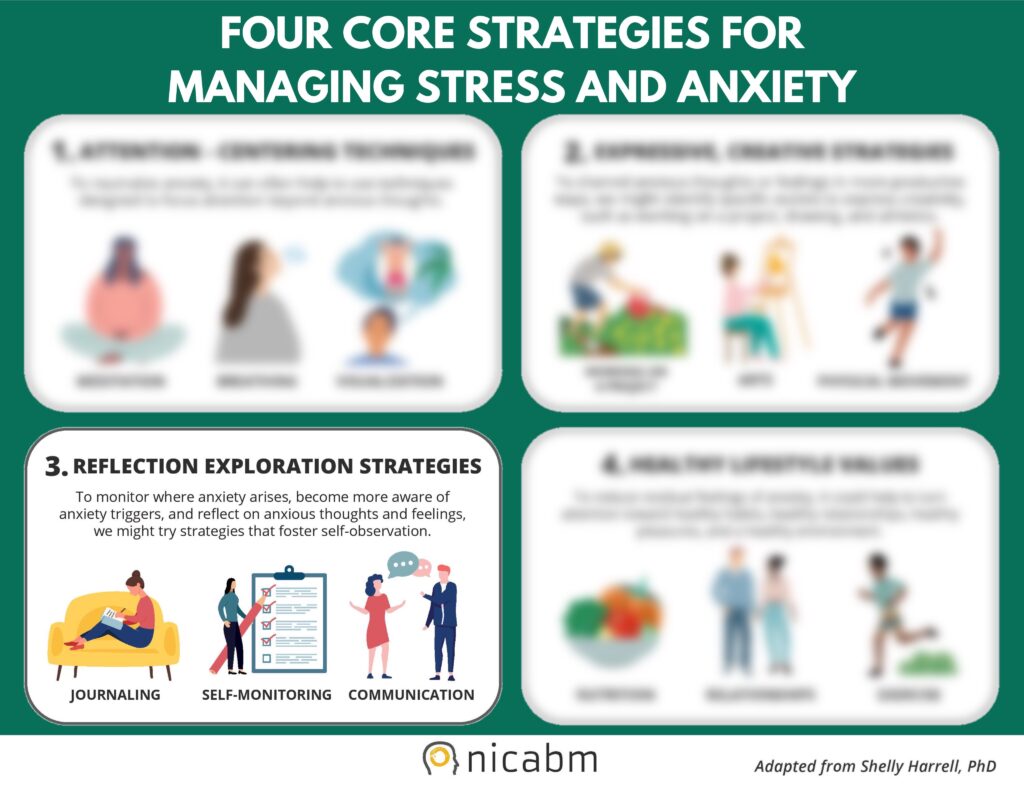Looking for ways to recognize and begin managing your stress?
Stress and stressful situations are an inevitable part of our lives. Over the last couple of weeks we’ve explored different exercises so you can begin managing stress. This is the third post of our four part Managing Stress Series, so if you haven’t yet, check out Part 1 and Part 2!

This week we are sharing some great resources and activities for reflection exploration as a strategy for stress management. Reflection Exploration refers to paying attention to your body, thoughts and emotions and noticing what might be triggering them. Some stress symptoms may include: headache, muscle tension or pain, fatigue, stomach upset, change in libido and sleep problems.
You may also notice your mood change through being restless, lack of motivation or focus, feeling overwhelmed, irritable or angry, or sad or depressed. Stress may influence your behaviour and you may notice over or under eating, angry outbursts, misuse of drugs, alcohol, tobacco or caffeine, social withdrawal, reduced exercise or pleasurable activities in your day. Noticing thoughts or emotions that come up may be difficult as well as knowing what is triggering your stress.
Journaling for Stress Relief
Journaling is a great way to get things down on paper to see if there are any patterns for you to explore on your own. It can help you get to know more about yourself, your thoughts and emotions.
Stress Reducing Benefits of Journalling & How to Journal
In this video, Holistic teacher, Evita Ochel explores the benefits of journalling to relieve, reduce and eliminate stress, and how to journal.
Self-Monitoring Your Stressors
Other ways to write things down and self-monitor to help you to track and identify triggers is to use charts or checklists. Often these strategies are in-line with Cognitive Behaviour Therapy (CBT) and may require additional support. CBT is not for everyone and may not be recommended for individuals with certain mental health challenges. If you are interested in trying, please see the links to free programs to access help.
Stress Relief Through Communication
Talking to someone can help get your thoughts and feelings out your head and help explore what may be happening for you. Talking to someone you trust is a great way to reduce stress by sharing what is going on. Sometimes when you share, you actually talk out and then figure out what is causing you stress. Other times, you may simply name your emotion(s) and this immediately sends a message to the part of your brain getting you wound up, and the fight, flight or freeze response is turned off! No danger here, brain, at ease!
Dan Siegel: Name It to Tame It
In this video, Author and Psychiatrist Dr. Dan Siegel explains brain-science basics and the two simple steps to calm someone who is experiencing intense emotions. He also explains how this process is working at a biological level by “squirting soothing neurotransmitters” in the brain!
*If you need immediate support around anxiety or excessive stress, please refer to our recent post.*
You don’t need to be feeling stressed to begin managing stress, in fact, it’s better to practice these exercises before hand so you’re better prepared for the next time you feel those unpleasant feelings.
Thanks for reading our post! The Workplace Wellness Blog is here to share tips and resources to help you be the best you can be for yourself, your social circle, and your home and work community!
Found this post helpful? Subscribe down below to be notified each time we share a new post!



